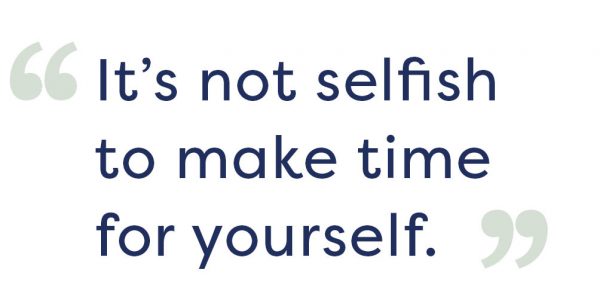Demystifying Dementia: Shout-out to the carers

In this week’s blog we’re looking at how to support someone with dementia while also supporting yourself.
Getting diagnosed with a condition like dementia is really tough but, unfortunately, the tidal wave of rubbishness doesn’t stop there.
It also has a massive impact on the people around them, who may have no idea how to support someone with dementia and whose own wellbeing often gets pushed by the wayside.
You do you
If you’re caring for someone with dementia then first off, great work, you excellent human. You may not get as much recognition as you deserve for this, but it’s tough and you’re doing great.
This means it’s especially important to look after yourself right now. That might sound selfish or just totally impractical but it’s like on an aeroplane when they tell you to put your oxygen mask on before helping others. You can’t support someone with dementia if you can’t breathe yourself.
So, make sure you’re taking some time for yourself. Eat some fruit and veg, even if all you want is 24/7 comfort food. Sleep as much as you can, get lots of rest and for goodness sake have some fun.
Try and get in a bit of exercise too. I highly recommend boxercise/boxing as a way to release the pure, God-given rage you may well feel during this time.
Challenges you might face
Communication is obviously a biggie here. Being supportive and trying to see things from the other person’s point of view is key. However, try not to do everything for them as it’ll only add to their frustration. It’s a fine line to tread and sometimes you’ll get it wrong, which is just how it goes. Don’t be too hard on yourself.
If they’re struggling to understand you don’t go all ‘British tourist abroad’ – try phrasing things a different way and make sure you’re speaking clearly and not too fast.
The person who’s been diagnosed with dementia might feel depressed or anxious – and you might too. They might struggle with self-esteem and confidence, or get more easily frustrated and angry than before.
If they act strangely it could be because they need help with something but aren’t able to tell you, so have a list of basic needs to run through. Checking if they’re hungry, tired, need the toilet or are in pain all sound basic but they genuinely might not have realised.
It might feel like your relationship with the person has also changed and you’ve become more of a carer, which can be hard.
First steps
Get straight on down to a GP, who should be able to provide you with a fair smorgasbord of support. They can put you on a carer’s register and you might be entitled to benefits, especially if it’s affecting your work life.
Do a bit of reading around dementia to help you spot when it’s the condition making them act strangely which might help it feel less personal.
While people with dementia might not remember everything you do with them, they will remember the feelings they had. So, although a fun day out might feel like a waste of time, they’ll remember that they felt happy.
Help them get some coping strategies in place, like support groups and a healthy lifestyle, which will in turn help you. Techniques like reminiscence – where they look back at their life story – are good for their health and prompts like photos or music can jog memories.
It’s not all doom and gloom either. Some carers find their new role brings them closer to the other person, and are proud of themselves for everything they’re doing in this difficult time.
Remembering why you’re doing it can be a massive help but it’s also totally normal to feel anger, guilt, sadness, grief, embarrassment and any other colour of the emotional spectrum.
Other ways to make your life even a tiny bit easier
As well as your GP, talking to friends and family is a good idea. Support groups for carers and counselling might help too.
At Onward we run dementia cafes in Middleton with Dementia Friends, both for carers and people with dementia. Give us a call 0161 654 6869 for more information.
Technology is an absolute legend here too. It can help with boring life admin – like paying bills or doing food shops online – but there’s also a lot of tech out there to help engage and support people with dementia. Have a look online or ask your GP.
You might also be able to get some practical support from places like your housing provider. At Onward we offer aids and adaptations, and some support paying for them, in certain situations.
Whatever happens, it’s important to remember you’re not alone. Head over to our charity partner Alzheimer’s Society for lots more great resources.
Find out how we can help Onward customers adapt their homes


